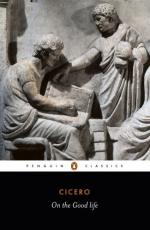|
This section contains 1,090 words (approx. 3 pages at 400 words per page) |

|
Happiness Is Stable
The theme of Discussions at Tusculum is that the happy life is one of moral goodness and only moral goodness. Cicero is out to defend the Stoic thesis that moral goodness is necessary and sufficient for happiness. There are no external goods that can add to supreme happiness, not food, water, sight, hearing, wife, father, or child. All of these things are mere 'preferables' whereas bads such as pain are 'unpreferables.' External 'goods' are merely choice worthy; they do not add to or complete happiness in any way. This thesis is in contrast to the Aristotelian-Peripatetic philosophy which holds that while moral goodness is nearly sufficient for happiness, it can be completed by the possession of some external goods. Cicero's argument is that of a traditional Stoic. Happiness must be stable. In other words, it must not be something that, once achieved, can be taken...
|
This section contains 1,090 words (approx. 3 pages at 400 words per page) |

|




